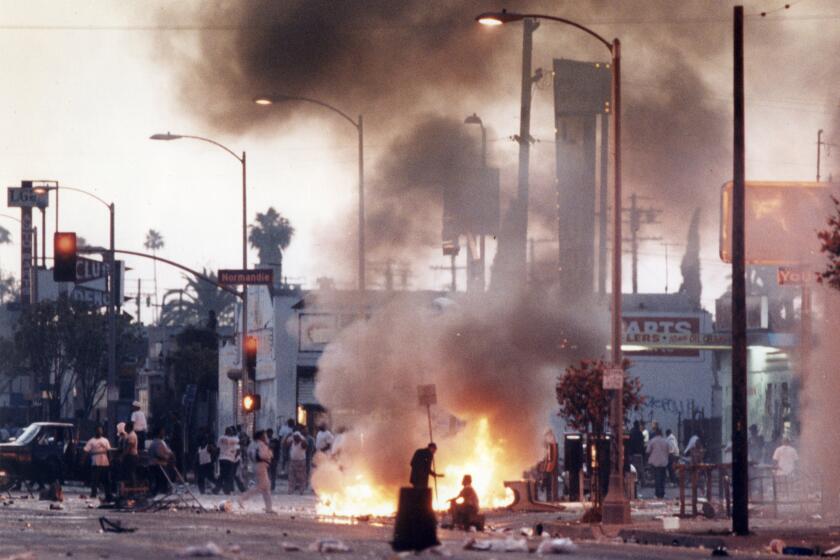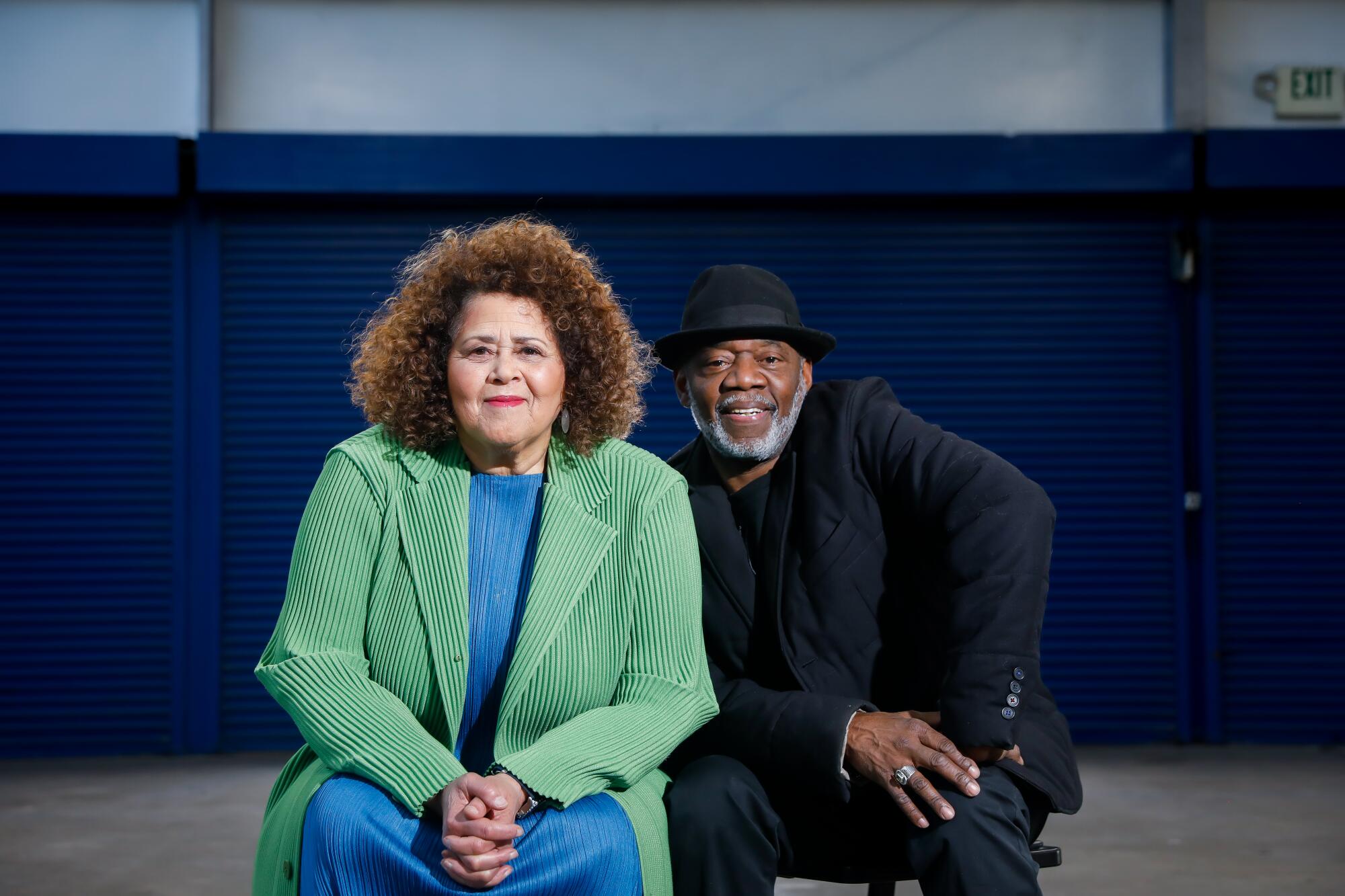
Inside the black box theater at a community arts center in the heart of Watts, a small cluster of people gather around tables, reliving the 1992 Los Angeles riots through the haunting voices of those who experienced it.
“It was like a storm! Like the eye of a storm! You know, it was a whirlwind. And I was in the eye of it. Know what I’m saying? Know how a tornado kicks up the winds like that? You got to realize the not-guilty verdicts was heavy on everybody’s mind. I followed the trial ’cause I wanted to see if justice works and on that particular day justice didn’t work.”
It’s been 30 years since Angelenos first heard those words in a groundbreaking stage performance by Anna Deavere Smith, who embodied some 40 real-life characters as she presented their accounts, verbatim, in “Twilight: Los Angeles, 1992.” Commissioned by Center Theatre Group’s then-artistic director, Gordon Davidson, Smith interviewed 320 people to document a kaleidoscope of perspectives in the aftermath of the brutal beating of Rodney King by LAPD officers and the subsequent uprising throughout the city following their acquittal at trial.
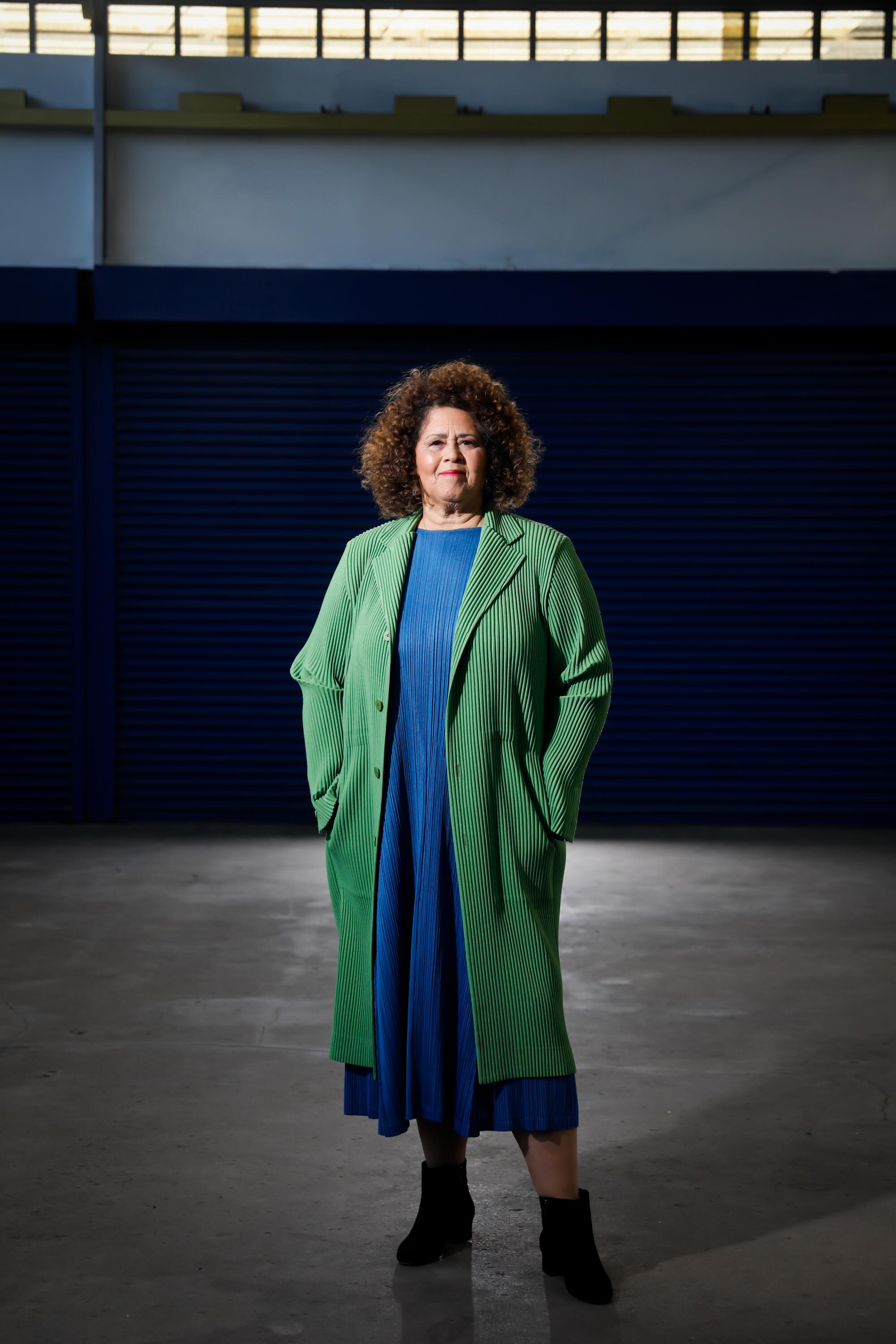
After its world premiere at the Taper in 1993, “Twilight” went on to have a brief run at the Public Theater, followed by a move to Broadway in 1994, then a national tour and finally a screen adaptation. Smith’s unique process of interviewing subjects, then shaping their actual words into a narrative play paved the way for future documentary-theater works like “The Laramie Project” and “My Name Is Rachel Corrie.”
Now “Twilight” is coming home — back to the Mark Taper Forum, where it began. But this time without Smith playing a spectrum of characters ranging from Rep. Maxine Waters to a Korean liquor store owner to one of the LAPD officers charged in King’s beating. Instead, a multicultural cast of five — Hugo Armstrong, Lisa Reneé Pitts, Jeanne Sakata, Sabina Zúñiga Varela and Lovensky Jean-Baptiste — will take the stage in a new production, directed by Gregg T. Daniel, an actor and artistic director of Lower Depth Theatre in Los Angeles. It begins performances on March 8 and opens March 15.
“It was always intended that I would make work this way for other actors. My dream was to have a company that would go around America. The whole oeuvre is called ‘On the Road: A Search for American Character,’ Smith says. “It’s a complete fiction that it was only for me.”
When “Twilight” debuted, Los Angeles was still raw from the violence, looting and destruction that tore apart the city. The events were set in motion by a scenario all too familiar today: A bystander videotaped LAPD officers savagely kicking and beating a Black man during a traffic stop as a dozen other officers stood by and watched. Four officers were charged in the beating.
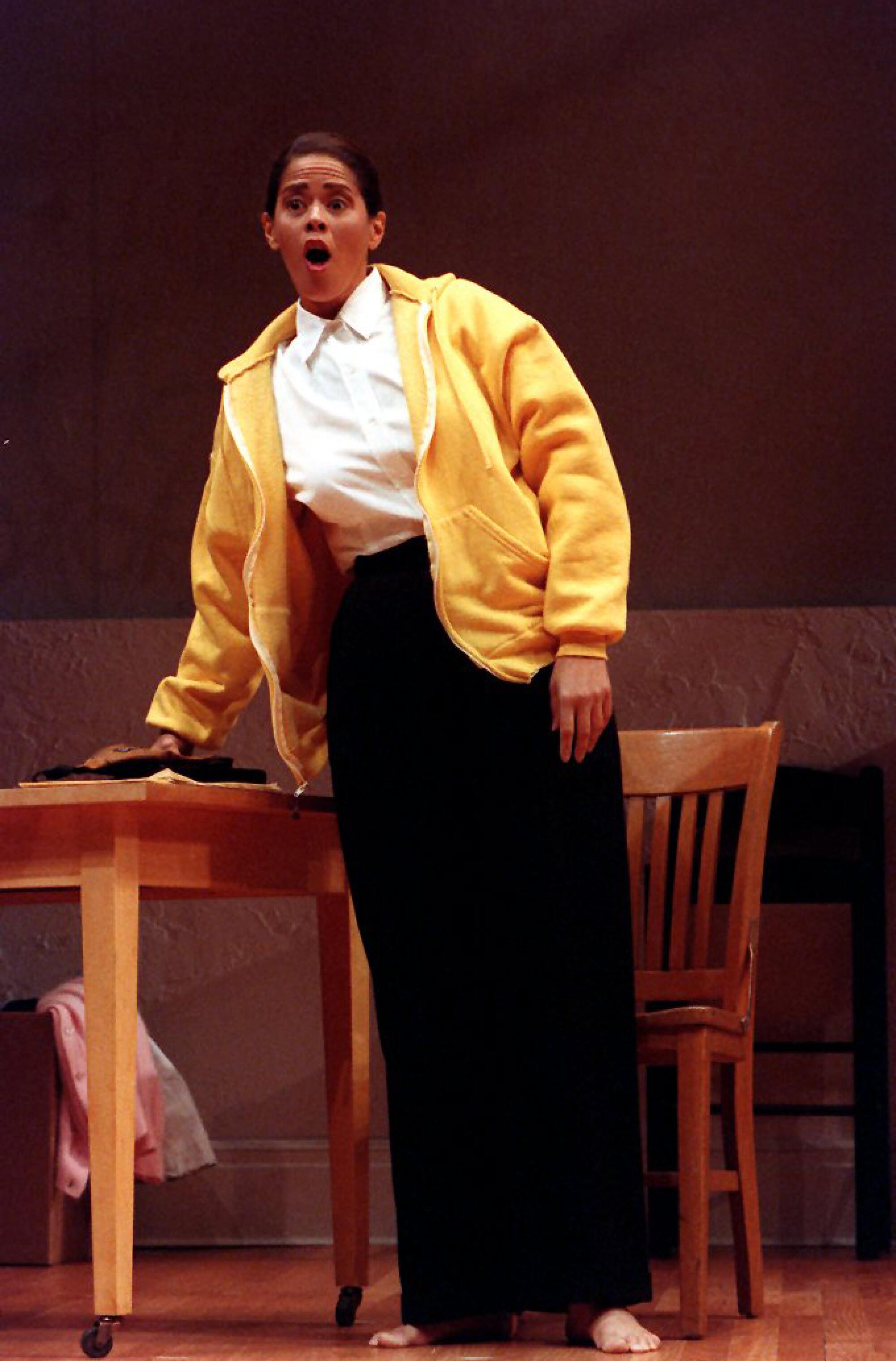
On the day the verdict came down in the King case, Smith was at the Public Theater in New York, inching toward the premiere of her similarly documentary-style drama “Fires in the Mirror.” The unrest in Los Angeles captured the world’s attention, and, Smith is convinced, helped make her one-woman play about the 1991 riots in Crown Heights, Brooklyn, a hit.
“As we know, especially from George Floyd or Michael Brown, there are these very brief windows of time where we are concerned about race in this country,” Smith says, recalling recent incidents of Black men killed by police. “That was this time.”
Now, in the shadow of the death of Tyre Nichols at the hands of Memphis officers, Smith remains adamant that “Twilight” does not take sides, while acknowledging that the police were wrong in their actions against King.
“I’m just not interested in that,” she says. “I get the feeling sometimes that people would like me to come down harder on one side or another. But I’m not a courtroom, I’m not a judge, I’m not a journalist.”
As director of the new production at the Taper, Daniel wants to stay true to that balance. “It’s just too easy to say, ‘OK, we’re going to vilify everyone white, everyone in law enforcement, vilify, vilify, vilify.’ How interesting is that? There’s no complexity in that.”
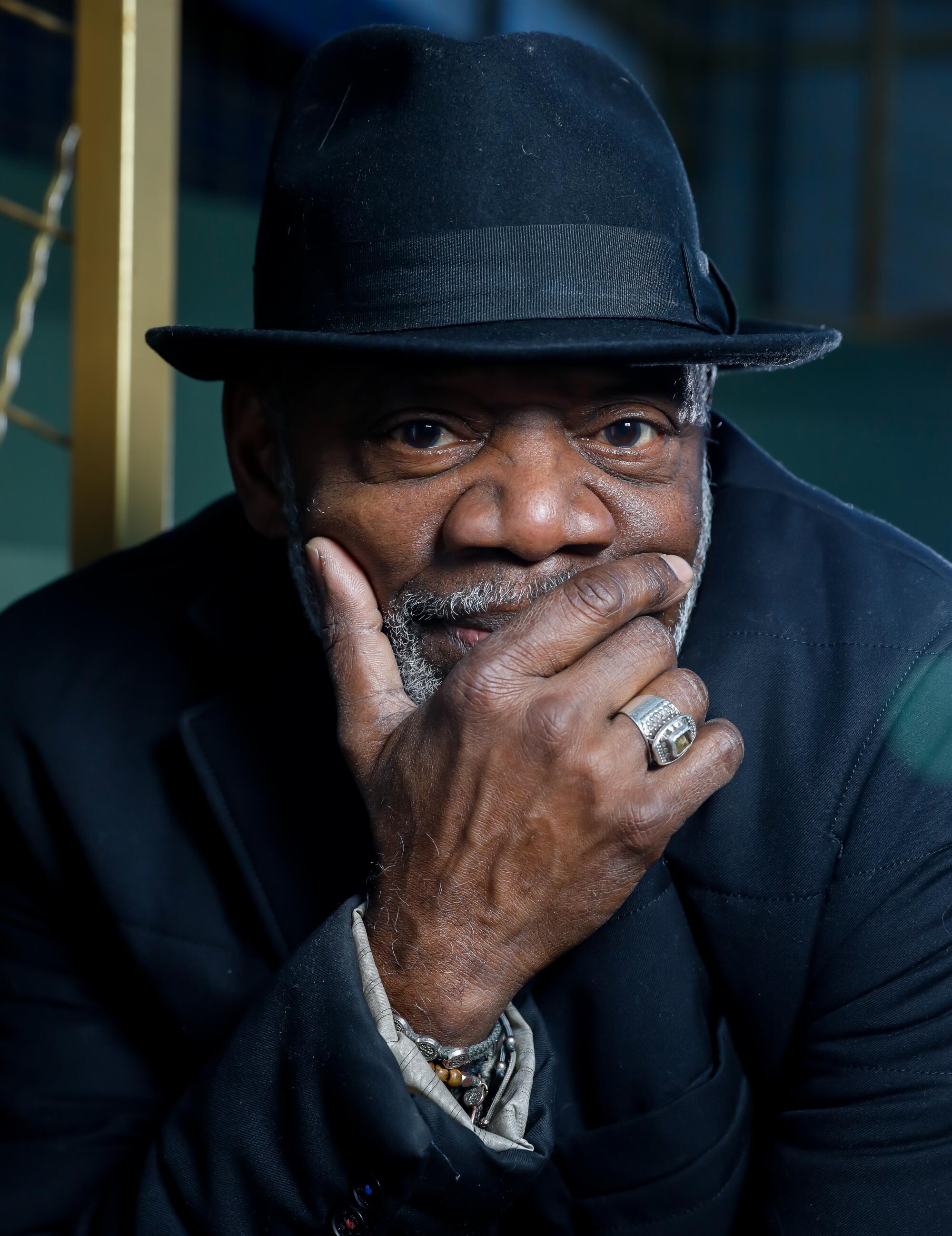
Smith recalls performing the show and seeing the differing responses of people seated next to each other. “They were laughing at something that somebody else was crying about,” she says. “To me, that’s success.”
Smith closed the book on “Twilight” after her screen adaptation in 2000. Or so she thought.
It’s odd calling Anna Deavere Smith’s “Notes From the Field” a one-woman show, given that the HBO production is filled with so many characters it often feels like a casting director’s worst nightmare and/or greatest dream.
The longtime NYU professor and playwright moved on to other projects, including “Let Me Down Easy,” which examines America’s health crisis, and “Notes From the Field” about the school-to-prison pipeline. And she quickly became a familiar face in film and on TV, notably in “The West Wing,” “Nurse Jackie” and most recently in “black-ish.”
But in 2019, when she was named playwright in residence at the Signature Theater, Smith returned to her two early documentary dramas. This time, Michael Benjamin Washington would star in “Fires in the Mirror,” while “Twilight” would expand to a cast of five.
After COVID delays, the new production finally opened in New York, then Boston’s A.R.T., demonstrating the enduring power of the play. But “Twilight” may resonate more deeply in its hometown of Los Angeles, where racial tension remains indelibly imprinted in the city’s memory. With that in mind, Luis Alfaro, then-associate artistic director at CTG, made clear to Smith from the outset that this production “has got to be of L.A.”
“The feeling was it really had to be L.A. artists,” Smith recalls, “And I was completely down with that.”
In keeping with that mandate, Daniel’s creative team is also L.A.-based. “I’m very proud when I can say we’re making this L.A.-based, because of the material. It happened here, it was commissioned here, it was about a historical incident in Los Angeles,” he says. “But it transcends all that.”
“Twilight” has, in other ways, come full circle.
Early in her interview process, Smith spoke with civil rights activist Ted Watkins on the expansive grounds of the nonprofit Watts Labor Community Action Committee, which Watkins founded as a social services and arts center in 1965. But even Watkins’ support for the community did not shield the site from falling victim to fires set by angry rioters. Today, the L.A. production of “Twilight” is taking shape in the theater inside WLCAC’s aptly named Phoenix Hall, which was rebuilt from the ashes of the Los Angeles riots.
Read our full coverage of the 30th anniversary of the L.A. riots.
The play also represents a personal full-circle moment for actor Sakata. “I was actually doing a play at the Taper in 1992 when the uprisings occurred,” she says. “It was a multiracial cast — Shakespeare’s ‘Richard II.’ The people coming into power with Bolingbroke, they were all people of color.”
The other actors have their own ties to Smith and the play. Jean-Baptiste was in high school when he, by chance, stumbled upon a copy of “Twilight” while scouring the library for a monologue for a speech and debate competition. “I read through it, and I was just blown away by the words,” he recalls. “Right away, I said this is the one.”
During a table read, Jean-Baptiste steps into the role of Henry Keith Watson, an ex-Marine and one of the Black men charged in the beating of Reginald O. Denny, a white man who was dragged from his semi-truck and pummeled senseless in an attack that was broadcast live on TV. Minutes later, the actor has shifted into a portrayal of opera soprano Jessye Norman.
“It’s a brand-new play — I’m approaching it that way,” says Daniel, who admits he was initially concerned the three-decade-old play would be perceived as a museum piece. “Anna felt comfortable enough to take these risks with these actors, reordering things and excavating pieces from before. It is a new piece.”
After spending just a few days with the cast, Smith made “significant but not monumental” adjustments tailored to this cast. “I was up last night until all hours,” she says, “revising a part of the play for these particular five bodies.”
She pauses. “Then I’ll leave it alone,” she adds, laughing. “Then ‘Twilight’ is going to be done again.”
For now.
'Twilight: Los Angeles, 1992'
Where: Center Theatre Group’s Mark Taper Forum, 135 N. Grand Ave., L.A.
When: 8 p.m. Tuesdays-Fridays, 2:30 and 8 p.m. Saturdays, 1 and 6:30 p.m. Sundays. Previews begin March 8; play opens March 15 and runs through April 9. (Call for exceptions.)
Tickets: $35-$105 (subject to change)
Info: (213) 628-2772 or centertheatregroup.org
Running time: 2 hours, 30 minutes, including one 15-minute intermission
COVID protocol: Masks are strongly recommended
More to Read
The biggest entertainment stories
Get our big stories about Hollywood, film, television, music, arts, culture and more right in your inbox as soon as they publish.
You may occasionally receive promotional content from the Los Angeles Times.
